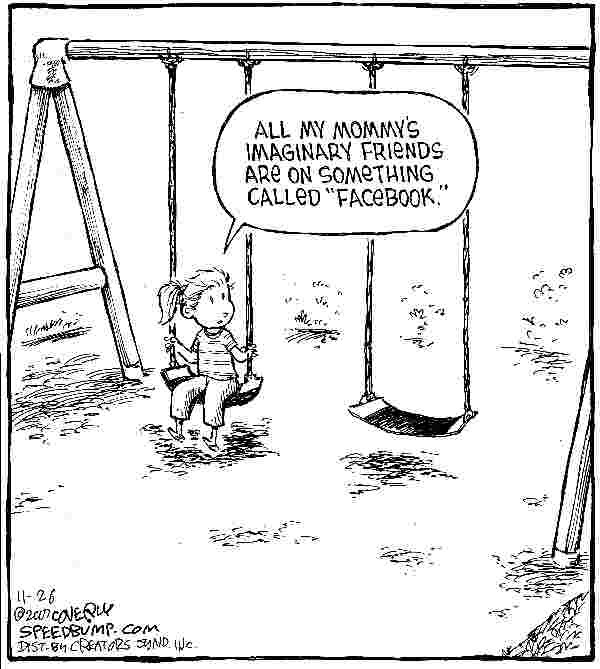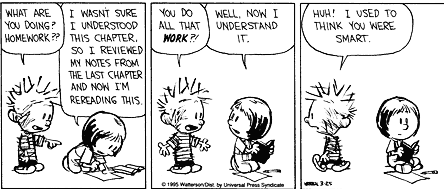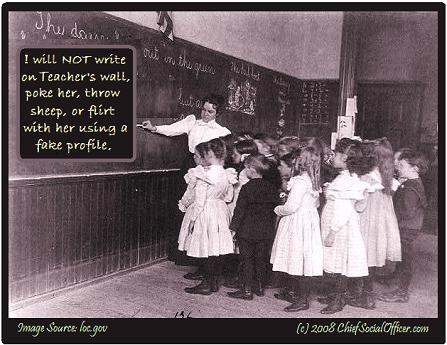
Facebook Group Guidelines

Because improving your critical thinking, reading, and writing takes disciplined, reflective practice, we’re going to use the class Facebook group to work on this development both individually and collectively. Recent studies suggest you may be spending 1-4 hours or more a week on Facebook, so why not get credit for it? (I mean, how many more "Which SpongeBob character are you?" quizzes can you do? Or make up?) I don't want this to be a "creepy treehouse," but rather a good space where you can keep talking, questioning, sharing, and clarifying what you're working on in class. Here's the link to our group: http://www.facebook.com/group.php?gid=248512178429
Requirements
1. You are required to make at least two substantive contributions to the group each week from the second week of class through the end of the term, not counting the week of Break. (This will be about ¾ of this grade; more substantive contributions will improve your grade, as will a variety of kinds of postings). Some of the ways you could contribute might be to make
A. Show and analyze posts. In these posts, you should find a recent item that deals with some piece of critical thinking/reading/writing that interests you. It can be text, sound, video, or photographic; for instance, you might take a link like the Chris Jordan video I posted and discuss it. You should comment on and link to the item you’re discussing; the link should be placed high in your post and your entry title should give us some idea of what you’re going to discuss (not “Weird video” but “An artist demonstrates his critical thinking”, as an example). Your posts must contain original content and not just summarize the information in the link. These responses can be argumentative, philosophical, analytic , or what you feel is appropriate (tone is up to you, but please keep it non-offensive). And of course, links must work. You can upload these in the Photos , Links, or Videos sections if that’s appropriate.
B. Exercises posts. Choose an exercise from each week’s readings in Nosich and Writing Analytically that particularly target areas we are focusing on, and post your answer to it on the discussion board or Wall.
C. Reflection posts. At times you may just want to talk through an idea, explore a question, or reflect on our readings and discussions or your own journey. Feel free to do that here. Please: no venting, no flames, and no offensive language. This community is part of our classroom and therefore needs to be a safe zone for us all.
2. You are also expected to respond to the posts of your classmates; again, shoot for a minimum of two thoughtful responses a week. While these will be less extensive than your blog posts, your comments must further the discussion, not just say “I like this” or “Interesting—thanks.” If at all possible, suggest ideas that the poster and your classmates may want to consider, or suggest resources (either human or online) that might illuminate the discussion. This will be about ¼ of the grade on this assignment.
3. Just in Time posts. Up to 30 minutes before class, if you have a question about the reading/work for that day, you can post a question for clarification in that day's class. I'll check the wall before class starts so that I can see if there are any of these. This can count as one response for the week.
4. In order to get credit for this assignment, you must turn in (on the last day of class) the list you have kept of all your contributions, both substantive and responsive. You can give me a hard copy, forward me your Excel list, or cut and paste them into an e-mail to me. It’s up to you to document that you’ve participated fully in this exercise; I'm not going to be a Facebook cop. That would be creepy.
General Rules for Contributions

“Accounting” for entries will be done at midnight the Sunday night each week ends, so for instance, the accounting for the week of Jan 18 will end at midnight on Sunday Jan 24. I spot check participation but I'm not going to play cop--it's your responsibility to keep up. Usually I'll check on two or three different people each week.
Attention in these entries should be paid to good writerly practice (spelling, punctuation, grammar, etc.). While I know this space invites informal writing, entries with excessive levels of error will not receive credit. So a missing comma or an emoticon won’t kill you, but don’t fall into the trap of spelling “before” as “B4” on a regular basis, please. :-)
I will leave the length of discussion posts up to you. They must be substantive; three or four sentences is not enough. I won’t specify a number of words unless people start cutting corners, in which case I will have to intervene (I’d rather not!). I’ll be checking different people’s entries each week to make sure that everybody is playing fair.
You need to keep track of what you publish and what others publish; I suggest you keep a running list in your notebook or a Word or an Excel file that documents the dates you post and the kind of contributions you made. You’ll need to turn these in as scheduled to get credit for this assignment. (I'll compare your records to mine to make sure we've got the same number of entries recorded.)
Some people find it hard to keep up with the Facebook discussions. I suggest you set your privacy notifications to be alerted when a new message is posted in the forum or on the group wall; that way you'll remember to participate.
I know that some weeks will be busy and you’ll struggle to keep up. No fewer than two participations a week is acceptable and no skipping a week, except for the week of Break. At the same time, don’t go off the deep end; more than six entries a week, unless there are special circumstances, is probably excessive. (Note: if you get into a really good discussion with classmates, the “six entries” comment is waived. Go for it.)
Feel free to set up side groups for oral presentations, discussions of research papers, etc. That's a great way to use the site, and those can count as posts in your weekly count.
Use Common Sense:
Guidelines for Our Interactions Online
Social media sometimes blurs the boundaries of what constitutes appropriate interaction between faculty and students. Here are the guidelines that I follow and that I expect you to follow for classroom interactions on social media:
I don't "friend" currently-enrolled students until after the course is over. That way you don't have to worry about your grade being affected by whether we're friends or not--they won't be, but it can get weird and I don't want you to worry about it. We can work together in our group without being Facebook friends; that's why I set things up that way.
I'll friend my advisees, English majors, and graduate students enrolled in English courses at any time you ask, as well as alumni of the English Department. I run the English department website and advise the Facebook alumni group for English majors, so that explains any exceptions to point 1.
I don't share intimate personal information on Facebook, and I don't particularly want to know about yours. So I don't post pictures of my wild Tupperware parties, etc., and I don't want to see yours. Let's keep those parts of our lives separate.
I won't post or say anything I wouldn't want your parents to see, and I hope you will do the same.
Discussion is allowed to get spirited, but please don't let it get mean-spirited (name-calling, flaming, etc.). Give everybody space for self-expression and keep the online group a Safe Zone. If you think the language is getting abusive, feel free to say something online, or ask me to step in.
When I'm posting in my role as a faculty member, I am representing Winthrop, so I have to maintain a certain level of decorum or professionalism. I hope you'll understand why I need to maintain that ethos and will respect it.